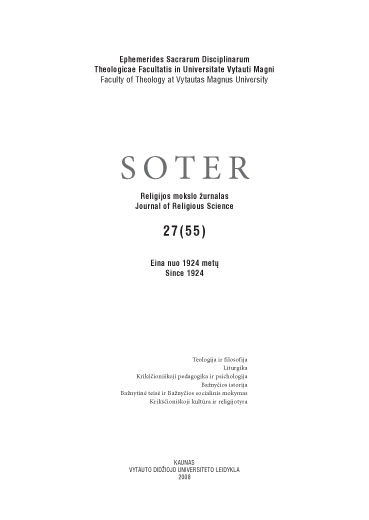Il lógos dell’esistenza ovvero della relazione che è libertà
SIGNS OF EXISTENTIAL (OR RELATIONAL) Logos FREEDOM
Author(s): Piero CodaSubject(s): Christian Theology and Religion
Published by: Vytauto Didžiojo Universitetas
Keywords: asmuo; laisvė; egzistencija; tikėjimas; human; freedom; existence; faith.
Summary/Abstract: Philosophy analyzes the world and the human in the light of the innate powers of mind, and that means with the help of wisdom. Wisdom is the spiritual means to our mind, which helps us orient ourselves wisely in the world and in life without the need for any prior particular details or knowledge. Wisdom grants us a wide spectrum of knowledge while trying to answer questions about the world and life. Reality and truth are not merely empirical, but also metaphysical. Christian existentialism has a unique relationship with the entirety of reality’s ontological foundations, which is called god, entirely and for all time made manifest in Jesus Christ (god’s Logos). Truth cannot be reached only through rational and logical thinking, because the two gnossological ways (intuition and proof) cannot be made clear on their own. Therefore, according to the author, it is necessary to change the perspective of the study: to switch from rational dogmatism to the truth and freedom that lies in God. Such a model of thinking allows us to understand reality sub specie aeternitatis, and the core of this reality is god. The postmodern crisis tempts us to live as if god does not exist or as if his existence has no influence or practical meaning. This attitude leads to serious outcomes in human lives and in existence in general. If metaphysics is ignored, it is inevitable that human existence will be lost. The idea of god (logos) grounds such words as truth, freedom, justice, righteousness, evil and good, words which give human life purpose. Christianity states that reasoning is a natural means of understand¬ing the reality that surrounds us, and faith is a natural means for trusting the Other, God, knowing that you are loved by that other, filled by his kindness/love. God is understood as a creator - the beginning of all beginnings. He is the one who keeps all time beating, the one without whom there would be no existence. All existence is intertwined with god, he is the one without whom there is nothing – only nothingness. All existence is in god, as in the very beginning, and god is in himself. Human relationships in freedom and in truth are based on the relationships of god’s Trinity of forms. Human relationships in freedom “reflect” god’s freedom, that is, the authentic freedom of human existence is like a natural continuity of god’s free¬dom. Christian life means to love one another, because that is how we reflect and coincide with god, “god is love”. Whoever lives in love lives in God, and God in him.” (1 John 4, 16) We can talk about the relationships that we see in god’s Trinity as intersubjective, the god/human relationship as outside of the Trinity, that is, in the story of redemption; - as intersubjective. We can see “god’s experience/memory” in human openness to transcendence in the desire to be eternal and happy. Christianity is a doctrine of freedom. The theological understanding of freedom is the theological understanding of the Trinity. God wants his c
Journal: SOTER: religijos mokslo žurnalas
- Issue Year: 55/2008
- Issue No: 27
- Page Range: 31-41
- Page Count: 11
- Language: Lithuanian

